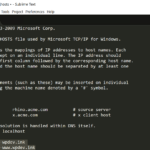SSL certificates have long been a must for browsing a website; and it is not that it is a fad, but they are necessary to keep the data traveling from the server to the browser secure. There are different types of SSL certificates available to protect the information that your website visitors will receive from end to end, and we want to put on the table the different variants before you go out and spend money without knowing.
The reality is that all sites must have an SSL certificate installed, and that’s why we are going to tell you about the main differences between one option and another.
What is an SSL certificate?
An SSL certificate is a digital certificate that encrypts the communication from the server, while the data packets are in transit to the destination device from which they were requested, using the https protocol. This means that if an intruder intercepts the communication established with a server that has an SSL certificate in operation while the data is traveling, the content of what is transmitted will be unreadable and will not make sense to the attacker.
Another function of SSL certificates is that they guarantee the authenticity of the website we are visiting, which means that it is truthful, and visitors will find the content they expected when accessing it.
Features of a paid SSL certificate
Paid SSL certificates have the characteristic that, in addition to encrypting the traveling data in a high security encryption, they are created by a certificate issuer which validates if the web domain belongs to its owner and different layers of business validation depending on the type of certificate hired by the owner of the website. Paid certificate types have at the same time different variants such as:
Classic SSL certificates, which allow validating and securing a domain or subdomain. Their cost is low to moderate (from $10 per year).
Wildcard SSL certificates, which allow you to secure a domain and all its subdomains at the same time. Their cost is moderate to high.
SSL certificates with business validation (EV), which in addition to all the above, perform validations of the business domain they are protecting, such as state tax forms, social contracts, operating agreements and telephone numbers. Their cost is high (+$100 Dollars per year).
Features of a free SSL certificate
On the other hand, we have the free SSL certificates. Free SSL certificates also allow information to travel encrypted from the server to the device from which you are visiting a web page with the same security and density as the paid ones, with the only difference that they are self-generated by the server owner, usually relying on Let’s Encrypt, which is an open source certificate authority, and free of charge for anyone who requires it.
Let’s Encrypt provides self-signed certificates that protect domains and subdomains free of charge, are valid for 90 days, and it is the server owner who has to schedule the renewal at the end of the period. All this can be automated through scripts so that both the website owner and the web hosting provider don’t have to worry about generating a certificate and renewing it. The free certificates from Let’s Encrypt are the ones most web hosting providers rely on, but there might be a few cases in which the provider includes a paid SSL certificate in the cost of the plan.
So far, so good: your data will travel encrypted and free from interception, but you will not have the validation of domain ownership and issuer’s seal as with paid certificates.
Free SSL certificate or paid SSL certificate, which one is better for me?
Simple: the reality is that most websites on the Internet are protected with a free, self-generated certificate from Let’s Encrypt, since they do not need domain or business validation to provide security to their visitors; so, unless you want to provide more confidence to those who browse your website and want to get a seal from the issuer, a free certificate will be more than enough.
What kind of SSL certificate does WNPower offer?
At WNPower, while we don’t want you to have to buy a paid SSL certificate and invest more money than you have to, we also don’t want to offer you a free certificate from Let’s Encrypt like other providers do.
That is why we generate agreements with the most important SSL certificate issuers, so that, when you purchase your hosting plan, you already have an SSL certificate installed with security validations, and with the seal of the most important certifying entities in the world, but without paying more for it.
Final conclusion
SSL certificates encrypt the information that travels from the server to the visitor’s browser so that it cannot be intercepted by third parties along the way. SSL certificates can be free, such as those provided by Let’s Encrypt, or paid, issued by an SSL certificate issuer.
Since you won’t have a choice and SSL certificates are mandatory for every website (unless you want to see a browser alert with a very negative message to your visitors because you don’t have one), you will have to choose between a free and a paid certificate. Fortunately most web hosting providers will offer you one from Let’s Encrypt free of charge, and if you purchase your web hosting plan with WNPower, we will install an SSL certificate on your domain, but stamped by a certified issuer, and at no cost to you.








